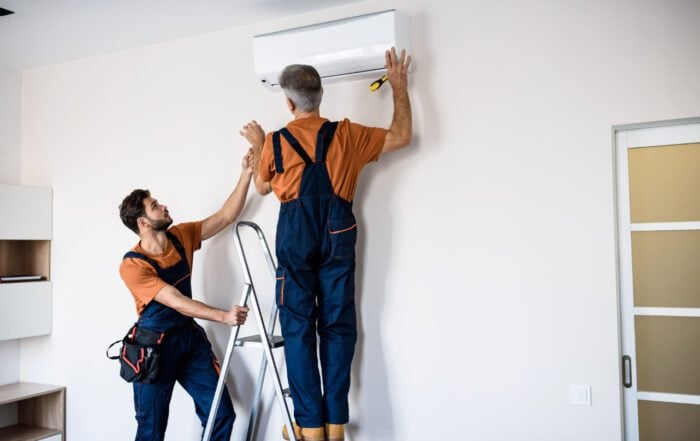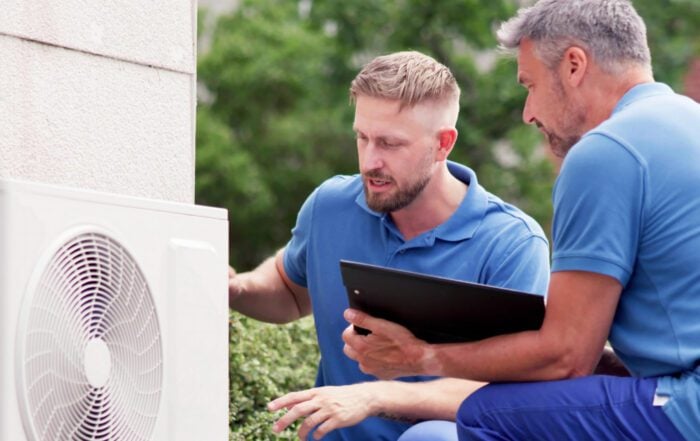When the leaves start to fall, you know the heating season is just around the corner. And if you’re looking for ways to save and cut costs this winter, a great place to start is with your energy bills. For most homeowners, achieving real energy efficiency requires more than merely slashing energy usage. HVAC experts like Stack have the knowledge to help you take advantage of every opportunity to increase your savings. And that begins with an energy assessment and continues with a maintenance schedule that will maximize efficiency. Read on to see how small changes can add up to significant savings.
Turn down the heat
Each degree that you lower your thermostat for eight hours or more results in a 1-3% savings on your energy bill. While you are away or sleeping, turn down the temperature by 10 degrees, and watch your energy bills drop.
Turn down your water heater
Many northeast Ohio homeowners unknowingly have their water heaters set too high. Unless your dishwasher requires a higher setting, turn the dial to “warm” or 120 degrees.
A thermal insulating wrap prevents heat loss from your water heater. This can also allow you to set the water heater’s thermostat lower without reducing comfort.
Install a programmable thermostat
Your home’s temperature needs vary throughout the day and night and when no one is home. Programmable thermostats allow you to set the temperature to change according to your daily or weekly living habits.
These units take the worry out of remembering to adjust your thermostat before you leave the house or head to bed. Set the thermostat according to your family’s schedule, and have it turn up the heat 15 minutes before you are due to wake or arrive home.
Inspect your ductwork
Leaky ductwork lets heated air escape and leads to lower comfort levels and higher energy bills. They can account for as much as 30% of conditioned air loss. Inspect visible ductwork, and seal any cracks or gaps with a duct mastic or foil-backed tape. For ducts that run through unconditioned spaces such as the attic or crawlspace, consider wrapping them with insulation to prevent heat loss.
Check for leaks around windows and doors
Air leaks are a huge problem for many homes because HVAC equipment suffers regular wear and tear that often goes unnoticed. The problem is so common that the Energy Star program estimates the typical home can improve air conditioner energy efficiency by 20% or more by merely sealing leaks. Older HVAC systems have even more to gain because issues such as damaged ductwork, clogged return registers, and improper airflow increase over time.
Wait for a windy day. Then inspect all window and door frames, wall outlets, pipes, venting, or electrical lines that run to the outside. Using a stick of incense, identify where cold air is coming in and seal these areas with door sweeps, caulking, or weatherstripping. Prevent heat loss through window glass by applying thermal film or adding storm windows or plastic sheeting. Window treatments also aid in keeping heat inside the home, where it belongs.
Add insulation
Once you fix the leaks, the next step is to check the condition of insulation at all vital areas of the home and HVAC system. To do the job right, it’s important that the best insulation for each part of the house is used, appropriately installed, and tested for effectiveness. When leaks are fixed and insulation is added, you also need a good ventilation system to make sure stale, unhealthy air is exchanged for healthy air.
Reverse Ceiling Fan Blades
When chill weather hits, many people turn ceiling fans off and forget about them until spring. This is because they are unaware that if you reverse the blade direction, the ceiling fan pushes heated air downward from the ceiling. When this happens, it helps make a room feel warmer. Using ceiling fans in this way can help you keep your thermostat lower and add more savings to your energy bills.
Look out for standby power
Are energy vampires running up your home’s utility bills? These vampires, otherwise known as standby power, bleed energy from your appliances, pulling power when plugged into the socket even when they’re turned off. You can save money and starve the energy vampires by unplugging your appliances and electronics when not in use.
To conserve energy and reduce your power bill, disconnect items that are not being used. You may prefer some products to remain on, such as timers or clock displays, but others serve no purpose when not in use and can easily be unplugged.
It may seem silly, but over time, these items can rack up significant and unnecessary spending. Fortunately, you don’t have to unplug every appliance in your house to stop energy vampires. Smart power strips allow individual outlets within the strip to be powered down, so you can select which items you want to disconnect and which ones should remain on. Also, consider:
- Setting your computer so that hibernate and standby features are enabled in both power and battery settings.
- If you don’t need the clock display on your coffee pot, oven or microwave, consider turning it off.
- If you don’t have an Energy Star-qualified refrigerator, oven, washer or dryer, consider upgrading. These appliances can’t be unplugged, but if they’re Energy Star-qualified, they’ll be more energy efficient than outdated versions.
Choose Energy Star – the best friend for your energy bills
When upgrading your HVAC system or any home appliance, choose those with the Energy Star label. Energy Star products have gone through Environmental Protection Agency testing to ensure the best energy efficiency and performance.
Schedule annual maintenance
Now that your home is set up for energy efficiency, you need your HVAC equipment to hold up its part of the bargain. You should service your system every year if you want to maintain peak performance. An annual tuneup consisting of a unit’s inspection, cleaning, and lubrication will keep it running more efficiently, as will regular filter changes throughout the heating season.
Regular preventative maintenance helps you avoid surprise breakdowns, increases the life of your system, and keeps your air healthy and comfortable. Even if you have a relatively new air conditioner, it still needs to be tuned. You will feel the difference in the humidity and airflow within your home and see the difference every month when you open the energy bills.
For more ideas on how to cut your heating bills this winter, call the experts at Stack Heating & Cooling. Since 1976, we have been providing exceptional service to the residents throughout northeast Ohio.
Have Any Questions?
If this is an emergency please call 440-937-9134.
Otherwise, please feel free to call us or submit this form to schedule an appointment for service or request an estimate. We will contact you shortly!



